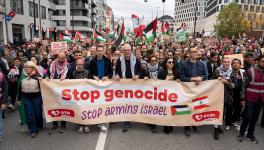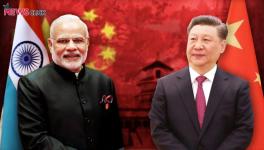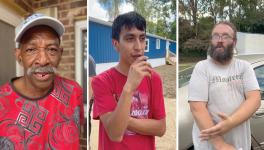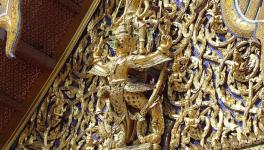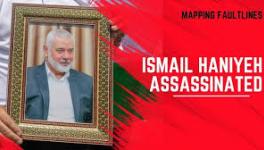Current Developments in Turkey
Newsclick discusses with Vijay Prashad, eminent writer and commentator, the current developments in Turkey. He says the main contradiction in Turkey at present is between democracy and authoritarianism. He also analyses Turkey's position in West Asia today.

Prabir Purkayastha (PP): Hello and welcome to Newsclick. Today we have with us Prof. Vijay Prashad, Trinity College. Vijay, you have been looking at what's happening in West Asia. Now, Turkey is latest or in the mix; for quite some years now, they have been setting themselves up as if they are going to be the arbiters of West Asia, the big brother over there, if you will, have been intervening in Syria in different ways for almost last two years. Suddenly, this whole movement that has taken place has put Erdogan on the back foot. So how do you really analyse Turkey's position today in West Asia, before we come to what's happening in Turkey itself.
Vijay Prashad (VP): I mean it's important to recognise that the party that is in power in Turkey, the AKP came into power saying that they were going to be a moderate Islamist force, a modern Islamist force, the cognate for that in terms of foreign policy was something that they began to call Neo-Ottomanism. That they were going to, in a way be a model for West Asia, for North Africa, a new way, a 21st Century way of being an Islamic democracy. That was their promise.
PP: Also, a bridge between Europe and Asia. The other thing that they were saying.
VP: A part of it would be in a sense they would bring these two contested civilisations, in their terms, together. That was the basic ideological claim they made. Now, the ideological claim you know, in terms of Neo Ottomanism was never going to be easy to establish. Firstly, the term itself was bitter in the mouth of many Arabs who understood the Ottoman empire to be an imperial project and not a project, say, like pan-Arabism which was a project of liberation. So when the Turks began to talk about Neo Ottomanism, that was not a very appealing framework and right when the Arab Spring broke out, the Turkish foreign minister, Mr. Erdogan himself, they were in Egypt and they travelled around in region, trying to promote this vision of a 21st century modern Islamic kind of democracy that they had answers, as it were. In a way, they overshot their own capabilities in at least two ways. The first way is that they decided that when rebellion broke out in Syria in March of 2011, that the Arab world nearest to them i.e., Syria would be the first model for their outreach as it were, and they went very far ahead of everybody else including the West in calling for the ouster of Mr. Assad. So that is one place in which they overshot their abilities.
PP: Overreached.
VP: Overreached, I mean very quickly they found that Mr. Assad was not a very easy chess player to play against, because he immediately put forward the Kurdish strategy. You know opening up Northern Syria and saying I am going to give autonomy to Kurds and the Kurdish parties, particularly the PKK which, you know, had to leave Turkey and had sought refuge in Iraq before the Americans came into Iraq, suddenly found that they had the capability of a new set of bases in Northen Syria and they re-engaged in Turkey.
PP: So effectively, he did not calculate that Bashar Al Assad could play some moves himself. But, apart from that, we will discuss Syria separately. Nevertheless, his initial belief seems to have been that Bashar Al Assad's government would fall very quickly. That hasn't taken place. A lot of the flames of war, if you will, have now reached Turkey itself. We have had bomb blasts over there. We have had a section of rebels hold up there and it has had an effect on Turkey's society. But more than that, what the Gezi Park Taksim Square protests have brought about, seems to me a complete re-alignment of resistance to Erdogan in Turkey. Do you think that is correct?
VP: There are two aspects of the AKP Politics. The internal politics that I think don't get discussed outside Turkey as often as they should. One aspect is, the kind of neo-liberal agenda, where you want to create a civilisation of malls; you want to create a civilisation of high speed ways for cars; the elite essentially will have a playground in the society and everybody else basically can be the spectators to the elite's joy. So there was a very strong neo-liberal bent to the AKP. Secondly, in a sense, a sort of contradiction - there is a very strong social agenda in the AKP that is quite suffocating. In fact, suffocating for those who would feel freed up by this sort of mall society that the AKP wanted to produce. So let's take some examples in the two months before the explosion around the park. Let's take the social thing first, because it came in a sense in advance. Mr. Erdogan without really attempting a public discussion in Turkish society decided, for instance, to ban abortions. He was not able to push this strategy forward because he met resistance. But almost unilaterally, he announced an end to the abortions. Then he decided to stop alcohol sales. I mean Turkey is amazing, I mean, there are so many restrictions on alcohol sales anyway. In fact, the tariff, the excise on alcohol is something like 600%. It is very expensive. Yet, he said, almost unilaterally again, that after 10 pm, alcohol cannot be sold. When he said this, of course, there was a push back and at the time he said why should we Turks take our orders from two drunkards, instead of, from the origin of our faith. Now the two drunkards he referred to were the first two leaders of the Turkish republic. The first leader being Kemal Ata Turk. You know, even though Ata Turk has a mixed heritage, a mixed reputation in today's Turkey, it's quite something to call Ata Turk an alcoholic and a drunk.
PP: Particularly after he saved really Turkey from the kind of occupation which was in the offing after the Ottoman empire fell and building a republic of the state on the ashes of the empire. So Ata Turk is still a big figure.
VP: Ata Turk has a big reputation. Yes, there is an Armenian genocide, there is this and there is that but he has a reputation among a section of the population that doesn't necessarily want to see him being discounted as an alcoholic. So this second thing was I think meaningful. It was not a trivial thing. Then when they announced that this park in Istanbul which used to be a military barrack until 1940 and then the military barrack was razed and a park was created, a very nice large park. Mr. Erdogan said that we are going to take this park back; again glibly said we are not going to build barracks; we might build shopping mall. You remember the thing that there is this neo-liberal mall culture that they are promoting, at the same time social suffocation. They were going to cut down a bunch of old trees, so you had environmental groups immediately upset about this decision, you had civic groups upset because the main park in Istanbul was just going to be seized.
PP: Its only green space.
VP: You have this cavalier social agenda being pushed by the AKP down the throats of a population that actually doesn't accept you know these kind of positions. Because the AKP actually came saying we are a moderate force. Even though, everybody said, “look they are not as moderate as they say.” So this was in a sense, a trigger for a lot of people to feel like that AKP has showed its face and it was no longer acceptable.
PP: Vijay, there is the other part of Taksim square, which people haven't really registered. He also banned May Day rallies in Taksim Square and if you remember, there had been massacres in 1977 on the workers, after firing was resorted to. So, Taksim square for the working class has a different resonance and it is the first time that May Day rallies were not allowed in Taksim Square. So even that is the other part of the element that the working class came out, the unions have come out against the AKP's policies particularly Ergodan's policies.
VP: In May, in the same month when there was this bubbling anger and animosity towards policy direction, the Turkish government bombed a village in Kurdistan and killed something like 30 people. You know, children were killed. It was a massacre; the government at that time apologised for something that had happened 70 years ago. But were unwilling to take any responsibility for the killing of civilians in this massacre. So these fissures in Turkish society were ready to come to the fore. Now, it's very important to also register that Turkey is a very literate society particularly in the sections that we are talking about, the big cities. There are thousand protests in thousand different places, protests broke out against the regime. But I don't think one should exaggerate this as well because the AKP yet has a support base, particularly in rural areas, in sections of the country where there is more fealty to a traditional way of life, one cannot say that the whole of Turkey is opposed to Mr. Erdogan. But, certainly, a very large section is opposed. When the trade unions came out and joined the movement, that was very significant and there was an escalation of demand from saving the park to the government must go. You know, almost within days. That's a very dramatic and important thing. Of course, this played very badly for Mr. Edogan because, you know, as with many modern States however liberal they may sound when they speak in press conferences, they sent out the riot police, they fired chemicals at the crowd. They used water cannons. Water cannon always sounds much less dangerous than it actually is. It sounds like some kind of benign thing it is actually a very dangerous weapon. A high pressure water is fired at people. In this water cannon frequently chemicals are added, tear gas was used.
PP: Tear gas is also apparently mixed with pepper spray.
VP: Mixed with pepper spray, you know, huge repression. This, of course, poses a problem for Turkey's Neo-Ottoman policy because when you are repressing your own public, when you are unable and unwilling to have a political discussion about social issues that you want to legislate on, this makes you look very much like the people you say should be overthrown by arms like Mr. Assad. So, you know, not only does Taksim Square open up questions of the fissures inside the Turkish society, but it also questions the validity of the kind of foreign policy approach that the Erdogan government was trying out.
PP: The other part of the Erdogan government also is that the President and the Deputy Prime Minister made much more conciliatory noises. But Erdogan from the beginning has been talking about hooligans and hoodlums and his basic approach has been of confrontation and telling them go home. Your parents should take you home. We will not tolerate this. The message has been completely intolerant and the belief that the majority that he has entitles him to a majoritarian approach to any politics. I have the majority you have therefore no right to oppose what I am doing. So he doesn't seem to understand democracy means rights even for a minority. This seems to be another element that Erdogan seems to be completely missing vis-a-vis his democratic stance which he had before this movement broke out.
VP: Well I mean, this is a broad problem in modern democratic states that we conveniently considered authoritarianism to be something of a cartoon description of power and anything short of that cartoon description of power is seen as democracy. So it's quite true that if you believe, just because you have a plurality or a majority in a legislative body, that you can rail road your own policies through, particularly social policies, which impact everybody's life. If you believe that and you say, well I am not being authoritarian because I have a majority, it's only that cartoon description of authoritarianism that enables this kind of majoritariarinism to masquerade as democracy. That's precisely what the AKP has been able to do. They hold on to the view that they are democratic principally because they yet have a majority in parliament. But majorities in parliament are not really majorities in society. You know, we know that from the 20th century's history and I think it's about time that there is a much broader discussion about what people mean by democracy and what they mean by authoritarianism.
PP: You talked earlier about AKP's rural mass base but the fact remains that rural population in Turkey is probably about 30-35%, not more. There is also the other element, the Anatolian bourgeoisie which is not Istanbul bourgeoisie which was wanting to align Turkey with Europe. This Anatolian bourgeoisie also made it big in recent years. Do you see that that alliance with the rural population with the Anatolian bourgeoisie and the AKP is shifting or that's the constituency which still holds behind Erdogan.
VP:I mean what choice does that constituency have. I mean, it has parked its cars in Erdogan's garage. They are not going to exit right now. The alternatives are not palatable to them. In some senses, this is the problem that all countries in Europe are facing. This is not so much a West Asian issue as a European issue. This has a lot to do with the European Union and what does entering the European Union mean. One section of the Turkish bourgeoisie is very keen on entering the European Union. The other section has a sort of National vision of their power base. They see themselves being swept if they enter their union. This is the kind of split that is there in Britain not identical there are similar debates. So there is that. I don't think that is going to be settled by the protests in the Square. This constituency is not going to be moved by the protests in the Square. What is happening around in the protests in the Square is that the remainder in the society might get radicalised away from the false message of the AKP and that is the promise for the next phase of Turkey. The section, the liberal section that had gone along with the AKP and provided it with the majority is now going to switch tools and go in another direction and where that direction is where it leaves, I think, is important because if the road that this direction picks just goes to the European Union, that's not necessarily going to settle some of the new grievances that have come up in Turkey. The danger is that this might get cast as a modern versus traditional or a secular versus Islamic kind of politics which I don't think it is. I think this is a politics of democracy versus let us call it authoritarianism. I think that's how it should be framed. This is not Islam versus secular, modern versus traditional politics.
PP: Majoritarian authoritarianism, if you will, which gets an electoral victory and constitutes that as a mandate for changing society anyway it wants. Last question, coming back to what it emerges, Taksim Solidarity which has got 120 odd organizations already coming in its fold, it has a huge chunk of students, football clubs, various intellectual bodies, lawyers came out in big support of that. Do you think this can provide what the Occupy Movement in the US did for some time and then faded out. Do you think this coalition that has come together has a potential to at least be able to push Turkey in the new direction?
VP: Well, let's not compare it to the Occupy Movement because that movement emerges in a position of infancy where there was almost no political organisational form to carry it forward. Let alone then a programme emerging out of Occupy. That's a politics of infancy. In Turkey, these are very sophisticated actors, many of them. These are people who have been around and understand the importance of the organisational form. Now, the question is will they be able to constitute a programme that they agree on, that they will work around. Will they constitute transitional demands. I mean Turkey is not going to have the history of Egypt because the military is not going to shift its allegiance. There is a separate history of the military's role in Turkish society than in Egypt and the military I don't think wants to intervene in this conflict.
PP: Clearly, they have no love for the AKP as you know.
VP: They have no love for AKP and they don't want to go in this direction. They I think are sitting out of this. As long as they sit out of this, there is not going to be a Mubarak type solution and nor is there going to be an easy co-optation threfore of the Square, of the solidarity around the park. So, I think there is a possibility if some kind of programme emerges, if a genuine understanding of the slow and patient nature of politics comes in, rather than Erdogan go and he is not going to go and then there is great disappointment, disillusionment, people are demoralised. If there is a sense of, the kind of patience of politics I think this could be an enormously productive direction for the emergence of a Left pole in Turkish politics which has been absent since the seventies.
PP: It is interesting what you said because Taksim Solidarity, if your read what statements they are making - they have talked of release of prisoners, they have talked of taking actions against police who have taken out identities and doing all these atrocities. So they have not pitched their demand Erdodan go. That was the slogan on the street, but that's not been their demand. So I think its interesting to see which way they will go. Thank you very much Vijay. I think Turkish movements are not going to go away quickly and this has set the stage for something which is quite new in Turkish society. For the time being, let's watch what's happening and we will be back with you later. Thank you very much.
VP: Thank you.
Get the latest reports & analysis with people's perspective on Protests, movements & deep analytical videos, discussions of the current affairs in your Telegram app. Subscribe to NewsClick's Telegram channel & get Real-Time updates on stories, as they get published on our website.












